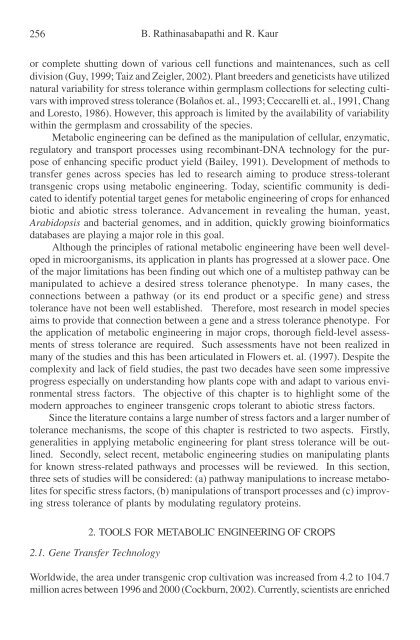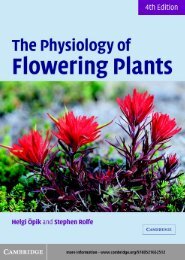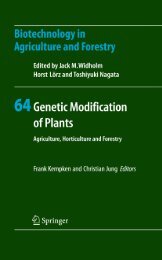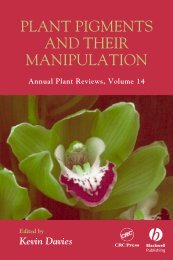Physiology and Molecular Biology of Stress ... - KHAM PHA MOI
Physiology and Molecular Biology of Stress ... - KHAM PHA MOI
Physiology and Molecular Biology of Stress ... - KHAM PHA MOI
You also want an ePaper? Increase the reach of your titles
YUMPU automatically turns print PDFs into web optimized ePapers that Google loves.
256<br />
B. Rathinasabapathi <strong>and</strong> R. Kaur<br />
or complete shutting down <strong>of</strong> various cell functions <strong>and</strong> maintenances, such as cell<br />
division (Guy, 1999; Taiz <strong>and</strong> Zeigler, 2002). Plant breeders <strong>and</strong> geneticists have utilized<br />
natural variability for stress tolerance within germplasm collections for selecting cultivars<br />
with improved stress tolerance (Bolaños et. al., 1993; Ceccarelli et. al., 1991, Chang<br />
<strong>and</strong> Loresto, 1986). However, this approach is limited by the availability <strong>of</strong> variability<br />
within the germplasm <strong>and</strong> crossability <strong>of</strong> the species.<br />
Metabolic engineering can be defined as the manipulation <strong>of</strong> cellular, enzymatic,<br />
regulatory <strong>and</strong> transport processes using recombinant-DNA technology for the purpose<br />
<strong>of</strong> enhancing specific product yield (Bailey, 1991). Development <strong>of</strong> methods to<br />
transfer genes across species has led to research aiming to produce stress-tolerant<br />
transgenic crops using metabolic engineering. Today, scientific community is dedicated<br />
to identify potential target genes for metabolic engineering <strong>of</strong> crops for enhanced<br />
biotic <strong>and</strong> abiotic stress tolerance. Advancement in revealing the human, yeast,<br />
Arabidopsis <strong>and</strong> bacterial genomes, <strong>and</strong> in addition, quickly growing bioinformatics<br />
databases are playing a major role in this goal.<br />
Although the principles <strong>of</strong> rational metabolic engineering have been well developed<br />
in microorganisms, its application in plants has progressed at a slower pace. One<br />
<strong>of</strong> the major limitations has been finding out which one <strong>of</strong> a multistep pathway can be<br />
manipulated to achieve a desired stress tolerance phenotype. In many cases, the<br />
connections between a pathway (or its end product or a specific gene) <strong>and</strong> stress<br />
tolerance have not been well established. Therefore, most research in model species<br />
aims to provide that connection between a gene <strong>and</strong> a stress tolerance phenotype. For<br />
the application <strong>of</strong> metabolic engineering in major crops, thorough field-level assessments<br />
<strong>of</strong> stress tolerance are required. Such assessments have not been realized in<br />
many <strong>of</strong> the studies <strong>and</strong> this has been articulated in Flowers et. al. (1997). Despite the<br />
complexity <strong>and</strong> lack <strong>of</strong> field studies, the past two decades have seen some impressive<br />
progress especially on underst<strong>and</strong>ing how plants cope with <strong>and</strong> adapt to various environmental<br />
stress factors. The objective <strong>of</strong> this chapter is to highlight some <strong>of</strong> the<br />
modern approaches to engineer transgenic crops tolerant to abiotic stress factors.<br />
Since the literature contains a large number <strong>of</strong> stress factors <strong>and</strong> a larger number <strong>of</strong><br />
tolerance mechanisms, the scope <strong>of</strong> this chapter is restricted to two aspects. Firstly,<br />
generalities in applying metabolic engineering for plant stress tolerance will be outlined.<br />
Secondly, select recent, metabolic engineering studies on manipulating plants<br />
for known stress-related pathways <strong>and</strong> processes will be reviewed. In this section,<br />
three sets <strong>of</strong> studies will be considered: (a) pathway manipulations to increase metabolites<br />
for specific stress factors, (b) manipulations <strong>of</strong> transport processes <strong>and</strong> (c) improving<br />
stress tolerance <strong>of</strong> plants by modulating regulatory proteins.<br />
2. TOOLS FOR METABOLIC ENGINEERING OF CROPS<br />
2.1. Gene Transfer Technology<br />
Worldwide, the area under transgenic crop cultivation was increased from 4.2 to 104.7<br />
million acres between 1996 <strong>and</strong> 2000 (Cockburn, 2002). Currently, scientists are enriched








